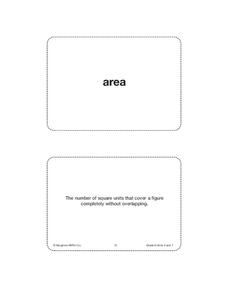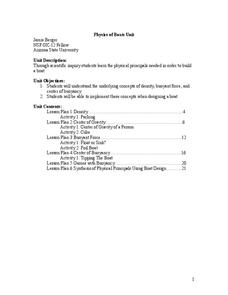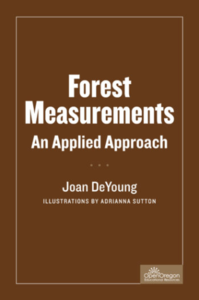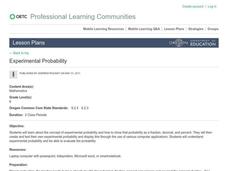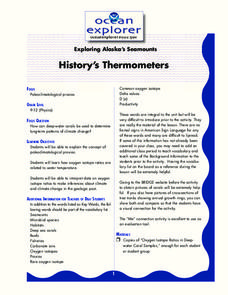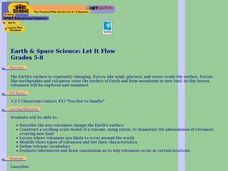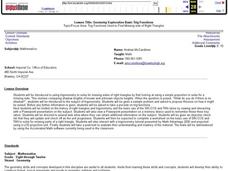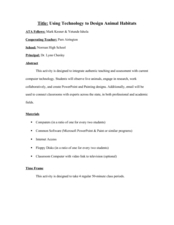Curated OER
Predicting the pH of Salt Solutions
A single page provides you with lecture notes for your lesson plan on hydrolysis. Introduce your chemistry class to Bronsted-Lowry theory by explaining the hydrolysis of acidic cations and basic anions. Show them how the resulting pH can...
EngageNY
The Scaling Principle for Area
As they investigate scaling figures and calculate the resulting areas, groups determine the area of similar figures. They continue to investigate the results when the vertical and horizontal scales are not equal.
Houghton Mifflin Harcourt
Unit 7 Math Vocabulary Cards (Grade 6)
Thirty-eight flashcards make up a set designed to reinforce math vocabulary. Two types of cards can be found here; a word card in bold lettering, and a corresponding definition card that offers a labeled example. Terms include area,...
Virginia Department of Education
Moles Lab Activities
Want my name and number? It's 6.0221415 times 10 to the 23rd, and my name is Avogadro. Providing nine different activities, experiments, and labs, this lesson keeps Avogadro relevant to your class all year long.
Virginia Department of Education
Acid-Base Theory
Litmus paper, why so blue? A chemistry instructional activity includes a pre-lab activity, practice calculating pH, an experiment measuring the pH in acids and bases, a titration demonstration, and a titration experiment.
Arizona State University
Physics of Boats
Let's go sailing! An instructive unit includes six lessons with multiple activities to teach scholars about density, center of gravity, buoyancy, and the Archimedes Principle. They can complete the final project of building a boat...
Computer Science Unplugged
Tablets of Stone—Network Communication Protocols
Show your learners that the game of Telephone isn't the only way messages get mixed up. Pairs transform into the sender and receiver of a message sent in packets. At least one pupil is the messenger who either delivers, delays, or...
Virginia Department of Education
Heat Transfer and Heat Capacity
It's time to increase the heat! Young chemists demonstrate heat transfer and heat capacity in an activity-packed lab, showing the transitions between solid, liquid, and gaseous phases of materials. Individuals plot data as the...
Willow Tree
Dimensional Analysis
Convey to your pupils the importance of units, then show how to use dimensional analysis to perform a unit conversion. The math lesson includes detailed worked-out solutions to guide learners in their practice.
Open Oregon Educational Resources
Forest Measurements: An Applied Approach
Geometry—it's not just for the math classroom! Learners explore the field of forestry through a mathematical lens. An instructional resource explains how forest workers collect data about trees such as height, diameter, and age...
Curated OER
Birds' Eggs
More than just data, scatter plots are full of information that can be used to answer a variety of questions. This lesson uses a plot with information about bird egg sizes to answer questions about the relationship between length and...
Howard Hughes Medical Institute
What van Leeuwenhoek Saw
When van Leeuwenhoek saw cells and single-celled organisms for the first time, he knew these small things were a big deal! Share his discoveries with young learners through a narrated video, model-building activity, and scale study....
Curated OER
Infinite Geometric Series
Eleventh graders investigate infinite geometric series. In this Algebra II activity, 11th graders explore partial sums of geometric series, converging and diverging series, and sums of infinite geometric series. The...
Curated OER
Sequences and Series
In this sequencing worksheet, students solve problems with sequences and series. They derive formulas to solve word problems and receive specific points for doing so. There are 8 questions with an answer key.
Curated OER
Fraction and Decimal Ordering
Ordering numbers just got physical! Learners practice putting numbers in sequence, both in fraction and decimal form. To begin, they line up in birthday order and discuss the difference between ascending and descending. They are then...
Curated OER
Experimental Probability
While just a simple activity, this activity on experimental probability could provide a way to connect this concept to real life. Learners begin by participating in a probability activity using a coin, and then move on to create their...
Shodor Education Foundation
Graphing and the Coordinate Plane
Ready to introduce your class to the coordinate plane? This website includes a detailed lesson plan that includes two interactive games to help learners practice graphing ordered pairs. The scripted discussion is a little cheesy and a...
Curated OER
Calculating Total From Percents
Using this short review of finding a percentage of a number, learners can practice important skills. There are twelve questions on this learning exercise.
Curated OER
Impedance Matching with Transformers
In this electrical circuit worksheet, students answer a series of 19 questions by analyzing schematics dealing with the transformers. Students will determine the amount of impedance to various scenarios.
Curated OER
Empirical Formulas
In this empirical formulas instructional activity, learners read about determining empirical formulas from chemical formulas. They determine the empirical formula given ten molecular formulas. They also find the molecular formulas given...
Curated OER
History's Thermometers
Students explain the concept of paleoclimatological proxies. In this oxygen isotope lesson, students interpret data and make inferences about climate changes in the geologic past.
Curated OER
Earth and Space Science: Let it Flow
Students engage in a lesson in which volcanoes be explored and examined. After watching a video, students create volcanoes out of clay.
Curated OER
Geometry Exploration Basic Trig Functions
Tenth graders solve for missing sides on a triangle using the Pythagorean Theorem. In this geometry lesson, 10th graders are introduced to basic trigonometry functions as they solve problems of right triangles. They discuss the...
Curated OER
Using Technology to Design Animal Habitats
Young scholars study the relationship between an animal and where it lives. In this habitats lesson students research to obtain data and create a professional report.


